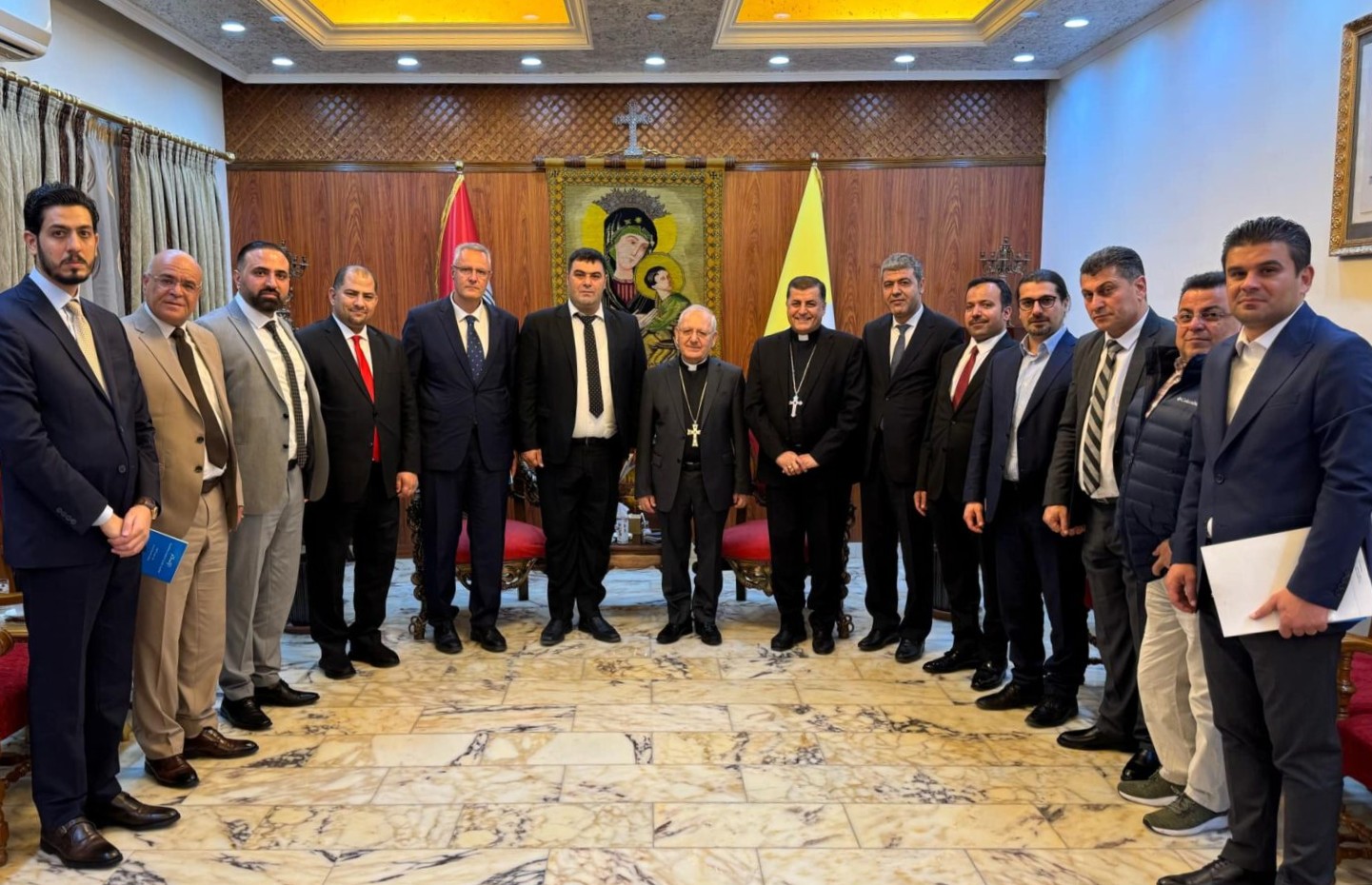Syriac Strategic Studies Center leads Baghdad research dialogues on regional cooperation and shared social and political experiences
BAGHDAD — The Syriac Strategic Studies Center (SSSC) played a central role in a series of high-level meetings by a Syrian delegation of research centers held in Baghdad this week, emphasizing the role of cultural diplomacy and academic collaboration in fostering regional stability, security, and cooperation. The discussions with key Iraqi leaders, highlighted shared goals of cross-border cooperation and advancing common values. The Syrian delegation also wanted to be informed by Iraqi officials how to keep a diverse society together in peace and harmony, without falling into violent conflicts. In recent years, Iraq itself has achieved a reasonable degree of peaceful coexistence after many difficult decades.
In the first meeting, hosted by Iraqi Prime Minister Mohammed Shia al-Sudani, participants reaffirmed Iraq’s support for Syria’s sovereignty and territorial integrity. Prime Minister al-Sudani stressed the interconnected nature of Syrian and Iraqi security, noting, “Stability in Syria is directly tied to Iraq’s own security.” The Syrian delegation contributed insights on cultural preservation and inclusive narratives, emphasizing the deep historical ties between the two nations. “We are committed to academic exchange and safeguarding our shared heritage,” said a member of the visiting delegation.
Subsequent discussions with Iraqi Parliament Speaker Mahmoud al-Mashhadani focused on legislative frameworks to bolster regional ties. Al-Mashhadani advocated for the establishment of a Federal Council in Iraq, positioning it as a model for governance across the region. Meanwhile, Deputy Speaker Shakhwan Abdullah met with the Syrian delegation to stress the importance of a unified vision for cultural and academic collaboration, which he described as critical for ensuring stability alongside political efforts.
The delegation further met with members of the Iraqi police and security apparatus, leaders and members of Iraqi political parties, including Ammar al-Hakim of the National Wisdom Movement, and Muthanna al-Samarrai of the Azem Alliance – to which Parliament Speaker Mashhadani also belongs.
Meeting with Chaldean patriarch Mar Louis Sako
Chaldean Patriarch Cardinal Mar Louis Raphael Sako welcomed the Syrian delegation at the Patriarchal Edifice in Baghdad on Wednesday evening. The discussions with the patriarch revolved around shared challenges and opportunities, seeking to harness lessons learned in Iraq and Syria for building inclusive, democratic states. The meeting underscored the pressing need for reconciliation and reform to ensure a sovereign state founded on citizenship rather than sectarian quotas or political patronage. “The experiences of our two nations have taught us that true democracy thrives when diversity and pluralism are embraced,” Patriarch Sako stated. He emphasized that constitutional principles and civil governance must create space for all communities to contribute meaningfully. Reflecting on the complexities of both nations, he added, “These ideas could serve as a foundation for a shared roadmap to build sustainable peace and unity.”
Patriarch Sako also highlighted the importance of national loyalty and fostering strong relationships with neighboring countries, stressing that revolutions should aim for positive change rather than retribution. The meeting touched on the application of international law, safeguarding individual freedoms, and maintaining social cohesion as essential pillars for long-term stability. Joining the delegation was Auxiliary Bishop Mar Basilios Yaldo, who reinforced the call for mutual understanding and constructive dialogue. Together, the church leaders affirmed their commitment to a vision of democratic development rooted in shared values and mutual respect.
Syrian research delegation
The Syrian delegation included the Syriac Strategic Studies Center, Omran Center for Strategic Studies, Harmoon Center for Contemporary Studies, Upper Euphrates Research Center for Sustainable Development, European Center for Kurdish Studies and the Syria Research Group. The delegation was invited by the Iraqi Group for Foreign Affairs, a non-governmental lobby group consisting of a academics and researchers specialized in foreign affairs: foreign policy, national security, economics in decision-making, alternatives and proposed initiatives.
The inclusion of the Syriac Strategic Studies Center in these high-level dialogues underscores the growing recognition of cultural and academic institutions as vital players in addressing regional challenges. By bridging communities through shared heritage and research, the SSSC and its partners are advancing a multidimensional approach to peacebuilding.
The meetings concluded with commitments to continue academic exchanges, deepen cultural cooperation, and organize future forums aimed at fostering mutual understanding between Syria and Iraq. Together, these dialogues reflect an enduring commitment to regional unity and a shared vision for a more stable future.




















